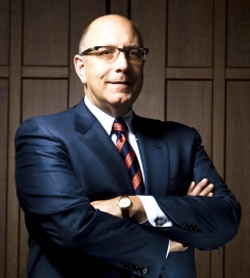Vox Populi is Dartmouth Now’s opinion department. It includes commentary written by members of the Dartmouth community intended to inform and enrich public conversation. The opinions expressed in these pieces are the writers’ own.
By Paul Argenti

Paul Argenti, professor of corporate communications at the Tuck School, draws advice for businesses from his November visit to the Occupy Wall Street encampment. (photo courtesy Tuck School of Business)
Paul Argenti is professor of corporate communication at Dartmouth’s Tuck School of Business. He has also taught as a visiting professor at the International University of Japan, the Helsinki School of Economics, Erasmus University in the Netherlands, London Business School, Università della Svizzera Italiana and Singapore Management University. He currently serves as Faculty Director for Tuck’s Leadership and Strategic Impact Program, and Tuck’s executive program for Novartis. Argenti’s most recent book (co-authored with Courtney Barnes) is Digital Strategies for Powerful Corporate Communication.
This essay is also posted on the Arthur W. Page Society Blog, as well as Professor Argenti’s own blog.
Last month, I had the opportunity to visit the Occupy Wall Street encampment in Zuccotti Park with my daughter Julia just a couple of days before it was dispersed by the NYPD. It immediately brought back memories of my high school days in the 60s and my time at Columbia in the 70s. The clothes, the look of the pamphlets, even the smells were the same. I was particularly fascinated by their incredible focus on communications and media. But something was very different. While the protests in the 60s and 70s were clearly for something (the end of the Vietnam war) this movement is very squarely against something—big business with no outcome that will ever satisfy the group and make it go away. Some may believe that this lack of focus makes the occupy movements in New York and elsewhere less worrisome or even irrelevant, but I think it is more insidious than most people in business realize. Let me explain why.
Recent polls show that attitudes about business are at an all-time low. In fact the only institution rated lower in the US than big business is the US Congress. That’s not the kind of company that most of us would like to be in. It also does not reflect what I believe to be true, which is that most businesses try to do the right thing, act responsibly in most cases, and provide society with benefits that are too numerous to mention here. But only about 10% of the people in the US believe that. And the blame now seems to be spreading to every industry. A recent Harris Poll asked people to identify which industries they think are generally honest and trustworthy; half of all consumers answered “None.”
Given such dissatisfaction, the occupy movement should make some businesses who truly care about reputation as a key asset think about what they can do to differentiate based on reputation at a time when consumers, employees, and people in the communities in which we operate are susceptible to negative information about big business. And the best companies in the world are doing just that. Take a look at IBM’s Smarter Planet strategy or WalMart’s focus on sustainability and you will understand what I am talking about.
In fact, I think that the most successful companies in the future will be those that realize that making the world a better place for those who follow actually leads to greater profitability and success in the long term. I wrote a paper earlier this year entitled “The Good, the Bad, and the Trustworthy” in Strategy & Business that offers more about how companies are differentiating themselves based on reputation.
Thinking back to those days at Columbia, I often think about one of the professors who had the most influence on me both then and now, the renowned anthropologist, Margaret Mead. Her thought should make us all worry a bit more about what the occupy movement might mean if we don’t focus on not just trying to have a good reputation, but actually deserving one in the first place:
“Never doubt that a small group of thoughtful, committed citizens can change the world. Indeed, it is the only thing that ever has.”
